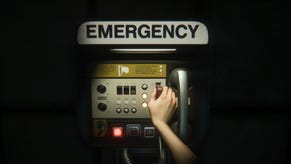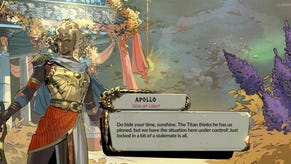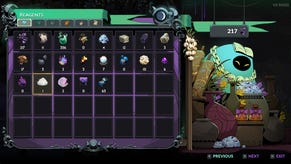Hades 2 early access review: a roguelike of witchy crowd control with a sparkling new cast
What fresh hell this is
Scylla and the Sirens are a rock band of mythical boat wreckers who insist they have tons of fans. (They do not.) As a boss battle in Hades 2 they are a deadly trio that has bested me more times in the last few hours than I care to admit. But as a sign of things to come for this early access roguelike sequel, they are an encouraging bunch of characterful malcontents. The harbingers of a confident, slash-happy action game, and another poppy adaptation of classic Greek japes.
Something sinister has happened in the underworld (no way!) and the pantheon of Gods is in disarray, along with all attendant heroes and hellions. Zagreus, our nippy protagonist of the previous game, is missing in action. So is helldaddy Hades and various others. Into this absence steps Melinoë, forgotten baby sister of Zag. Her goal in life is to kill the guy who allegedly tore her family asunder: Chronos, the Titan of time.

Should be easy. Off you go on a dungeon-running jaunt of encounters, boss brawls, boon scrounging, and character questioning. Those familiar with the first Hades will feel at home in the lush realms of Erebus, Oceanus and beyond. Newcomers will find their feet quick enough thanks to straightforward tutorialising. At least when it comes to hacking and/or slashing. As for the story, there might be more head-scratching. I've already said I admire Supergiant's dismissal of once-pivotal characters in our impressions of the Hades 2 tech test. Even so, the sequel definitely benefits from at least some existing knowledge of the previous cast.
Not that the current cast disappoints. The voice acting is satisfying and clean. The dry mothering of Amelia Tyler's witch goddess Hecate will be doubly powerful to anyone who enjoyed her as narrator in Baldur's Gate 3 (those sinister bedtime-story tones). Other actors put in the work. The skeptical harrumphs of Becca Q. Co's Nemesis. The comforting Yorkshire chatter of Dave B. Mitchell as Hephaestus, implying he is not only the god of smithing but also the god of pints.

There's a lot of fun to these performances. Melinoë interprets Charon's indecipherable groans ("Rrrrrrrgggghhhhhh") with the breezy insight of someone translating Lassie's barks. Scylla and the Sirens perform their songs with gusto; the inviting diegetic music we've come to expect of Supergiant's soundtracks. Nemesis fulfills her namesake by showing up in runs and challenging you to a goon-bashing contest (whoever wins takes the other's coin). Then she dashes off, blocking one path and stealing your choice of doorways away from you. A wonderful jerk move.
But the biggest teller of the game's confidence is in meeting Narcissus. He has an unmistakable Kenergy about him, somehow managing to portray a sad, lovable himbo even without final character art. You see, unfinished character designs currently appear as a dark figure in a placeholder shroud. Some of these gods are so hot, you dare not yet look upon them.
But I hear you. You bray to know of the game's violence. Let's see. You have more tricks up your bare arms than Zagreus did. Every attack now has a charged alternative version, giving every weapon four attacks by default (five if you count a dash attack). These supercharged "omega" attacks cost magick, and the management of this magick bar makes up a hefty portion of your upgradey decisions in the underworld. For me? I'm getting the most out of Melinoë's broad and debilitating Cast ability.
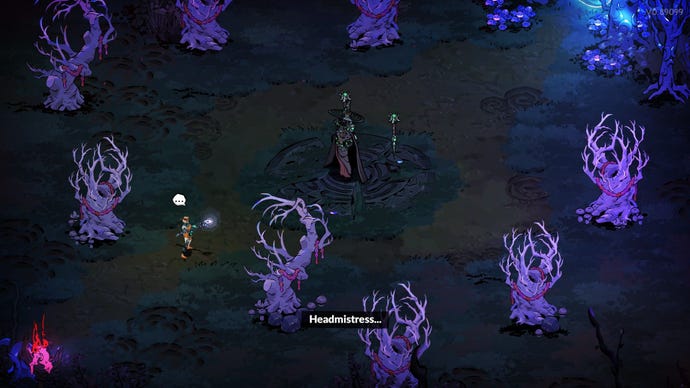
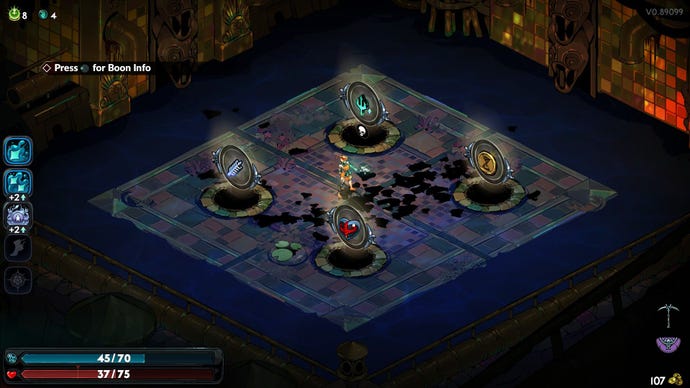
Previously, Zag would fire little bloodstones that lodge inside enemies, giving baddies a negative status effect as you go about your fight. But Melinoë instead gets a wide area-control ward that stops enemies in their tracks. It can get buffed as you go on, turning it into a whirlwind of constant damage, or a ward that follows you around instead of being imprinted on the spot.
As someone prone to panic on busy screens full of VFX and enemy sprites, I'm grateful for the crowd control. When the pressure is on and I'm surrounded, it becomes a go-to instinct to drop a ward and dash away to catch your breath; a much-needed "I'm overwhelmed" button. Melinoë's ability to sprint (hold down the dash button) also helps me feel more mobile and slippery than Zag ever was.
It's a case of having old problems with some new solutions. Like before, encounters become a hectic flow of priorities as you flit around the battlefield like an excited wasp in a sauna. These room-by-room scraps do feel, to my taste, more controlled than in the first game. But the sense of gut-following amid pressure is the same. Trap the wailers in place, chase down the worms, clean up the slowfolk with a few light strikes, then finally go focus on the big lad with the shield. Pat off the dust, you've just earned a boon.
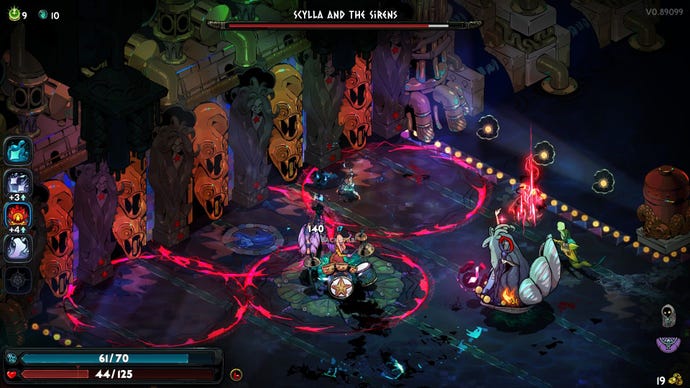
This is where the on-the-hoof character builds come in. We're still deep in roguelike turf after all. As in OG Hades, boons are tokens sent by the Gods which buff your usual moves in some way. Many supplement that jealous control of space. A boon from Demeter lets you freeze enemies in place with distant knife throws, for example. One of Poseidon's powers grants your normal attacks a splashing knockback effect. Another augments your sprint with a blast of minty fresh air, repelling all foes you pass by.
Others focus on hurt. Zeus might give your special attacks thunderous damage or electrify your body so that you auto-zap any enemy that hits you. Other gods may grant bonuses like a speedy restoration of your magick in exchange for a much shorter bar. Hephaestus, the blacksmith god of Guinness, might provide armour (temporary extra hit points) or imbue your weapons with infrequent, powerful swipes.
Things get more complex when Selene the moon goddess eventually shows up alongside the other boon-gifting gods, granting you a Hex ability. This is a powerful magical attack that might allow you to transmogrify enemies into critters, or fire a hideously powerful beam of energy, or become a nightmare version of yourself with whole new attacks. There is a trade-off, though. To perform a Hex you first need to burn through a ton of magick, which means you have to enter encounters at full tilt, magick akimbo, if you want to get the most out of Selene's gifts. It's basically like enacting the "make it rain" gesture. But instead of blithely upending stacks of paper money you are spamming arcane death.
My favourite randobuild so far was coupling Demeter's freezing capabilities with some backstabby nonsense that let me beat Melinoë's adoptive mum Hecate by frostifying her and sticking her in the kidneys over and over while she was unable to move. I haven't yet found the perfect combination of boons, upgrades, keepsakes and what-have-you to gain victory over the second boss - those troublesome Sirens. But I'll give it a few more shots before I resort to the returning "God mode", which makes things easier following each death.
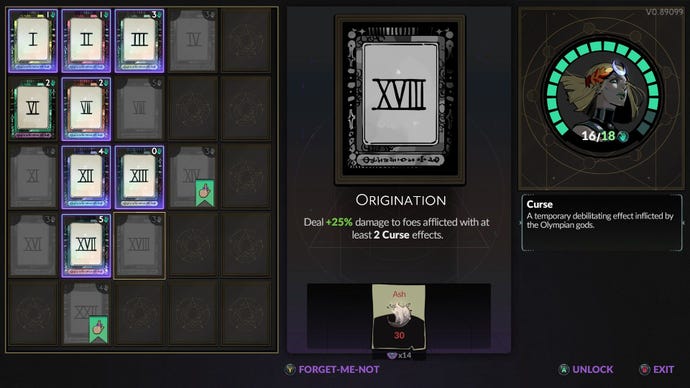
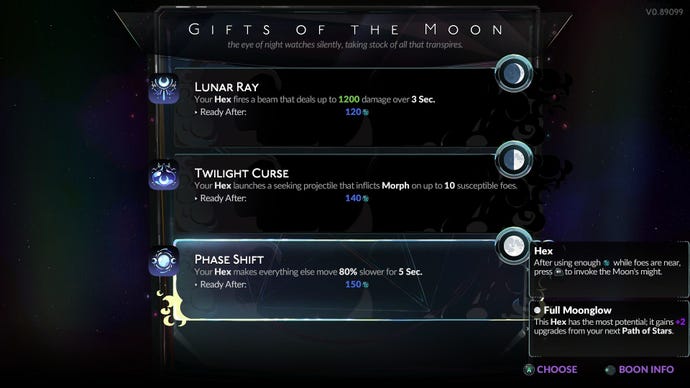
Those dungeon dives are only part of the craic, of course. The many currencies and bartering mechanics of the game's hub zone require a broker's mindset and possibly a big spreadsheet. You don't get the depth of Hades without a certain amount of complexity when it comes to upgrade materials and required items. At one point I was thinking: "Okay, I can swap Bones for Nectar, then use that to schmooze more Gift Card Thingys from Charon, then exchange those for a shipment of Fated Fabrics..."
So yes. There's a feeling of getting caught up in archaic underworld economics. Hades 2 wants you to have a long and varied to-do list (literally - the three Fates still give you a list of prophetic tasks to accomplish) and part of this is making sure you have a wide spread of resources to scrounge. That to-do list of arithmetic did start to feel a bit overwhelming. But then again, I hate sums.
There are quality of life things to help with this. At the cauldron you can mark recipes with a "forget-me-not". This means a little icon (a finger with a knot tied around it) will appear on certain doors during your run, marking the optimal path for whatever resource you're gathering. It's a small but helpful touch that I don't remember from the first game. Environmental conditions also cause certain items to crop up more often. Rainfall, for example, means you will find lots of mushrooms. It all adds more depth to the rando-gen possibilities of a run.

There are misgivings. As with the first game, I like it less the more bullet hellish it gets. The trade-off for beautiful and flashy effects is that sometimes the battle becomes hard to read. Much of this is a matter of getting used to exact splash ranges of gassy attacks. The imprecision of these painful clouds does keep you on your toes but it can also feel a little unfair. Sometimes you're simply certain you weren't in range of that puff of scarlet smog. Likewise when some small element of the environment - a cluster of roots or a stray outcrop - hampers a critical escape. It's hard to know what among these frustrations is accidental and what's intentional, designed to reward the growing expertise you're certain to accrue with hundreds of runs.
But it's encouraging that these worries are so few and far between. Roguelikes, I feel, don't suffer as much as other genres from the early access path. The first Hades did it and it quickly became one of our best action games. So, I hereby grant you permission to crack through as much as this follow-up has got to offer, to get briefly obsessed, and then to put it aside for months. The piecemeal, adaptive storytelling is still there too, eschewing anything so simple as the classic three-act structure. Which, for me, makes long absences that much easier to bear. Like the game's own shrouded Narcissus, Hades 2 is already inviting and attractive, even in its unfinished form.
This review is based on a retail build of the game provided by the developer.


